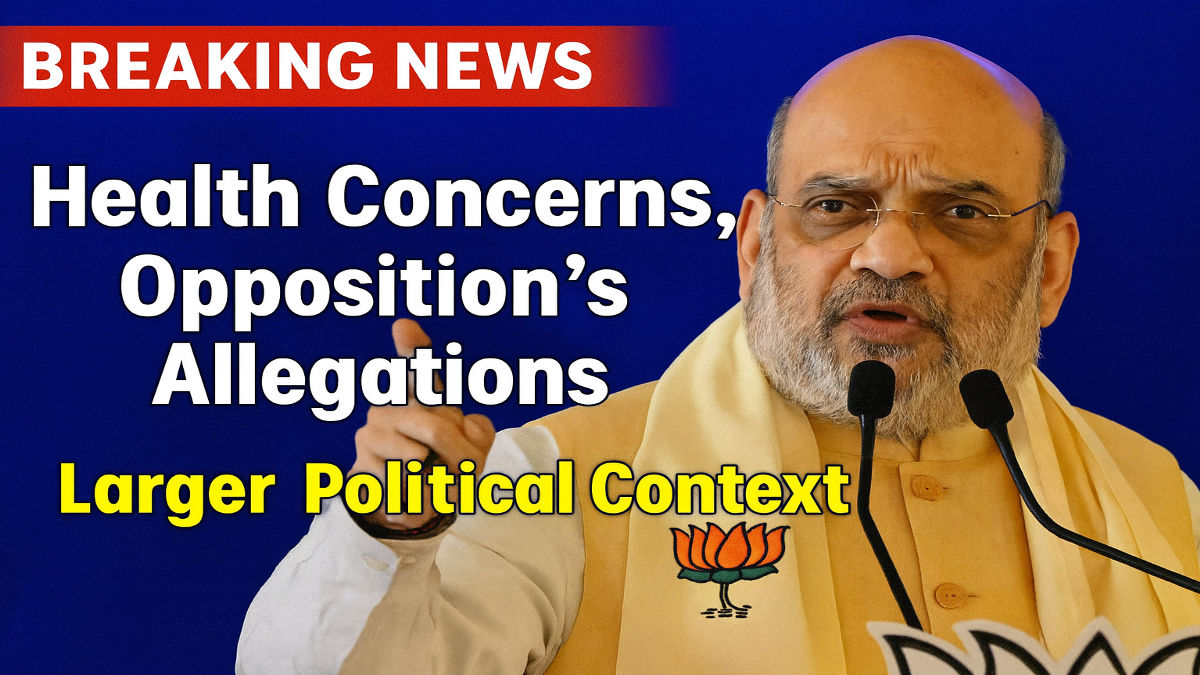Health Concerns: Indian politics is never short of drama, narratives, and counter-narratives. The resignation of Jagdeep Dhankhar from the post of Vice-President of India on August 25, 2025, sparked a wave of political debates across the country. While Dhankhar cited health reasons for stepping down, the Opposition raised sharp questions and claimed that the former Vice-President was under a form of “house arrest.” This development came at a crucial time in the political calendar, intensifying the already heated exchanges between the ruling Bharatiya Janata Party (BJP) and the Opposition, especially the Congress.
Union Home Minister Amit Shah, one of the most prominent and influential leaders of the government, intervened quickly to clarify the situation. In an interview with ANI, Shah categorically rejected the Opposition’s claims, insisted that Dhankhar resigned purely for health reasons, and accused the Congress of deliberately trying to create “illusions” to mislead the public. This article explores the details of Shah’s statement, the controversy surrounding Dhankhar’s resignation, the Opposition’s counterarguments, and the broader implications of this episode for Indian politics.
Health Concerns: The Resignation of Jagdeep Dhankhar
Jagdeep Dhankhar, who served as the Vice-President of India since 2022, resigned from his constitutional position citing Health Concerns. His tenure had been marked by frequent confrontations with the Opposition, particularly during sessions of Parliament. In his resignation letter, Dhankhar expressed gratitude to the Prime Minister, Union Ministers, and colleagues in government, thanking them for their cooperation during his time in office.
The timing of his resignation, however, raised eyebrows. With important parliamentary sessions and critical legislation under consideration, many political observers questioned why Dhankhar chose this moment to step down. The Opposition was quick to allege that there was more to the resignation than what met the eye, hinting at political pressure or even restrictions on his freedom of movement.
Opposition Claims of “House Arrest”
The Congress party and other opposition leaders wasted no time in questioning the government’s narrative. They suggested that Dhankhar had been sidelined and was being kept under restrictions that limited his independence. The phrase “house arrest” entered the political discourse, with senior opposition leaders hinting that the Vice-President was not allowed to act freely in the weeks preceding his resignation.
Such claims, if true, would amount to a serious constitutional crisis. The Vice-President is the second-highest constitutional authority in India after the President, and any suggestion of restrictions on his freedom would undermine the foundations of parliamentary democracy.
Amit Shah’s Rebuttal
Union Home Minister Amit Shah strongly dismissed the Opposition’s allegations. In his interview, Shah pointed out that Dhankhar’s resignation letter clearly mentioned Health Concerns as the reason. According to Shah, it was unnecessary and irresponsible to read political motives into a personal decision.
“Dhankhar Sahab’s resignation letter is clear in itself. He has cited health reasons for his resignation. He has also expressed heartfelt gratitude towards the Prime Minister, other Ministers, and members of government for his good tenure,” Shah said. He added that speculations about “house arrest” were entirely baseless and reflected the desperation of the Opposition.
Shah emphasized that Dhankhar had discharged his duties according to the Constitution and had stepped down on his own volition. He argued that dwelling excessively on the issue was unwarranted and only created confusion.
The Accusation of Creating “Illusions”
In his sharp critique of the Congress, Shah accused the Opposition of trying to manufacture illusions to mislead the public. He suggested that repeated electoral defeats had created frustration within the Congress leadership, leading them to adopt disruptive strategies rather than constructive politics.
According to Shah, “They (Congress) want to create a kind of illusion among the people. And they will definitely not succeed, because our direct interaction with the people is many times greater than theirs. We talk to the people. We haven’t just come here and sat by chance. After losing three elections, I think the level of frustration is such that the normal sense of judgment, he (Rahul Gandhi) has lost it.”
Shah’s statement was a clear attempt to turn the debate away from Dhankhar’s resignation and towards the credibility of the Opposition. By framing the Congress as desperate and disconnected from the public, the Home Minister reinforced the ruling party’s narrative of electoral legitimacy and popular support.
The Context of Repeated Electoral Defeats
Shah’s remarks also highlight the broader political context in which this controversy is unfolding. The Congress has faced repeated defeats in national elections and several state polls over the last decade. The BJP, under the leadership of Prime Minister Narendra Modi and Amit Shah, has maintained a strong hold on national politics, leaving the Congress struggling to find momentum.
By pointing to Congress’s electoral failures, Shah suggested that the party is resorting to unfounded allegations to remain relevant. This line of argument resonates with the BJP’s larger narrative that the Opposition lacks credibility and is disconnected from the aspirations of the electorate.
The Question of Security Personnel Inside Parliament
The controversy around Dhankhar’s resignation also overlaps with ongoing debates about security arrangements in Parliament. Recently, the presence of Central Industrial Security Force (CISF) personnel within Parliament was questioned by opposition parties. In response, Shah clarified that any security personnel operating within Parliament are considered “Marshals” and fall under the authority of the Speaker or the Chairperson.
“The identity of the force itself does not matter. Earlier, it used to be personnel from the Delhi Police; now it is CISF,” Shah explained. He further added that Marshals only enter the House when ordered by the presiding authority. This clarification sought to neutralize criticism that the government was altering traditional parliamentary practices for political purposes.
The Constitutional Amendment Bill
Another major aspect of Shah’s interview was his reference to the Constitutional Amendment Bill that seeks to prevent Prime Ministers, Chief Ministers, and Ministers from continuing in office if they are arrested and detained for 30 consecutive days on serious criminal charges.
Shah expressed confidence that the Bill would pass in Parliament. He argued that the Bill was rooted in moral responsibility and was not aimed at targeting any specific leader or party. According to him, many opposition members would also support the legislation in order to maintain moral integrity in politics.
He also clarified that the Bill provides fairness to affected leaders. If a leader is granted bail even after the 30-day period, they can retake their oath of office and return to their position. Shah insisted that the law was designed to prevent governance from being conducted from jail, not to victimise politicians.
Balancing Morality and Fairness
Shah’s defence of the Amendment Bill highlights a key debate in Indian politics: the balance between moral accountability and fairness. On one hand, the idea that leaders facing serious criminal charges should not hold office resonates strongly with public opinion. On the other hand, concerns about misuse of such laws against political opponents are real and valid.
By emphasizing the role of courts as a safeguard and clarifying that bail restores a leader’s eligibility, Shah attempted to reassure critics that the law would not be misused. His argument was that the Bill creates a moral benchmark without denying due process to accused leaders.
The Political Strategy Behind Shah’s Statements
Amit Shah’s interview was not just about clarifying Dhankhar’s resignation. It was a strategic political intervention aimed at shaping the narrative on multiple fronts. By dismissing the Opposition’s allegations as baseless, defending parliamentary security practices, and justifying the new Amendment Bill, Shah positioned the government as confident, transparent, and focused on governance.
At the same time, his sharp criticism of the Congress’s frustration and attempts to create “illusions” reflects a broader electoral strategy. The BJP has consistently framed the Congress as a party of disruption rather than constructive politics. By linking Dhankhar’s resignation controversy to this narrative, Shah reinforced the perception that the ruling party remains in control while the Opposition struggles for relevance.
Opposition’s Likely Countermoves
The Opposition, however, is unlikely to let the issue fade away quickly. Questions about Dhankhar’s resignation will continue to be raised in public meetings, press conferences, and possibly during parliamentary debates. The Congress may try to frame the resignation as an example of institutional pressure under the Modi government, linking it to broader concerns about democratic freedoms and constitutional independence.
Whether this line of attack will resonate with the public remains uncertain. The BJP’s electoral track record suggests that the ruling party has been successful in framing its narrative more effectively than the Opposition. Yet, issues concerning constitutional offices like the Vice-President carry symbolic weight and may influence segments of the electorate concerned about democratic norms.
The Public Perception Factor
Public perception will play a decisive role in shaping the impact of this controversy. For the BJP, ensuring that the narrative remains focused on Dhankhar’s health and the Congress’s alleged desperation is critical. For the Opposition, keeping doubts alive about the circumstances of the resignation could serve as a way to mobilize public opinion.
The larger question, however, is whether the public is engaged enough with this issue to let it influence voting behaviour. In a political environment where issues like inflation, employment, and development dominate the discourse, constitutional controversies may not always translate into electoral outcomes.
The Legacy of Jagdeep Dhankhar
As the dust settles on his resignation, the legacy of Jagdeep Dhankhar as Vice-President will also come under reflection. Known for his sharp interventions and strong defence of parliamentary procedures, Dhankhar often clashed with the Opposition. His tenure was marked by assertiveness in upholding the Constitution and ensuring decorum in the Rajya Sabha.
Supporters of the government view him as a Vice-President who stood firm against disruptions, while critics argue that he leaned too heavily in favour of the ruling party. Regardless of these differing opinions, his sudden resignation adds a layer of uncertainty to how his legacy will be remembered.
Conclusion
Amit Shah’s clarification on Jagdeep Dhankhar’s resignation underscores the complexities of Indian politics, where every event becomes a battleground of narratives. While Shah insists that health reasons were the sole factor behind Dhankhar’s decision, the Opposition continues to raise questions, framing it as part of a broader struggle over democratic accountability.
The episode also intertwines with debates about parliamentary security, constitutional amendments, and the future of political morality in India. As the BJP and the Congress continue their war of words, the public will ultimately judge the credibility of these competing claims.
For now, Shah’s intervention has provided the ruling party with a strong counter-narrative. But whether it will be enough to silence the Opposition’s questions remains to be seen. The resignation of a Vice-President is no small matter, and its political ripples will continue to be felt in the weeks and months ahead.







